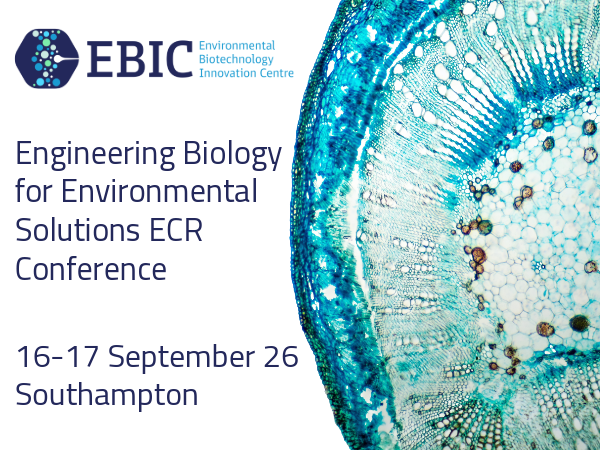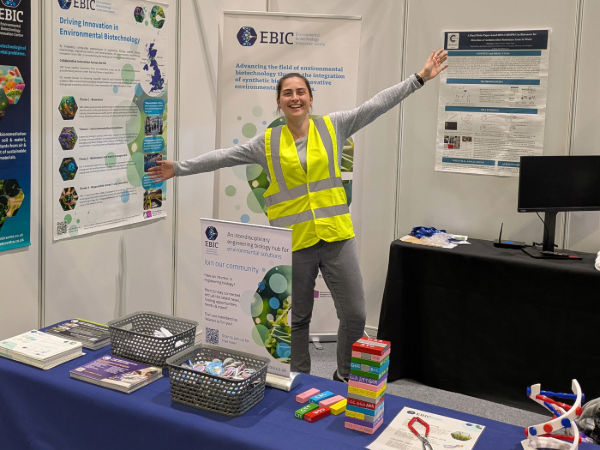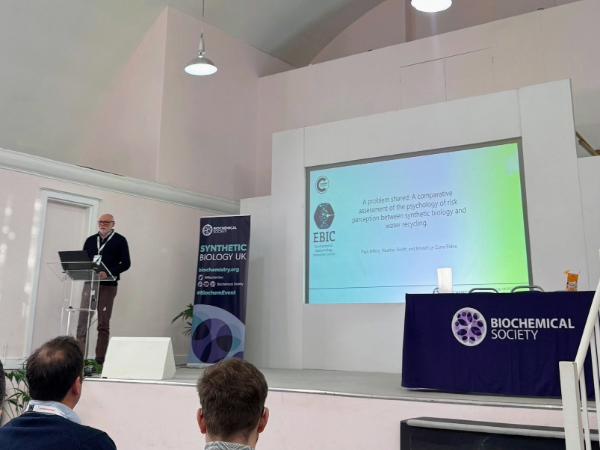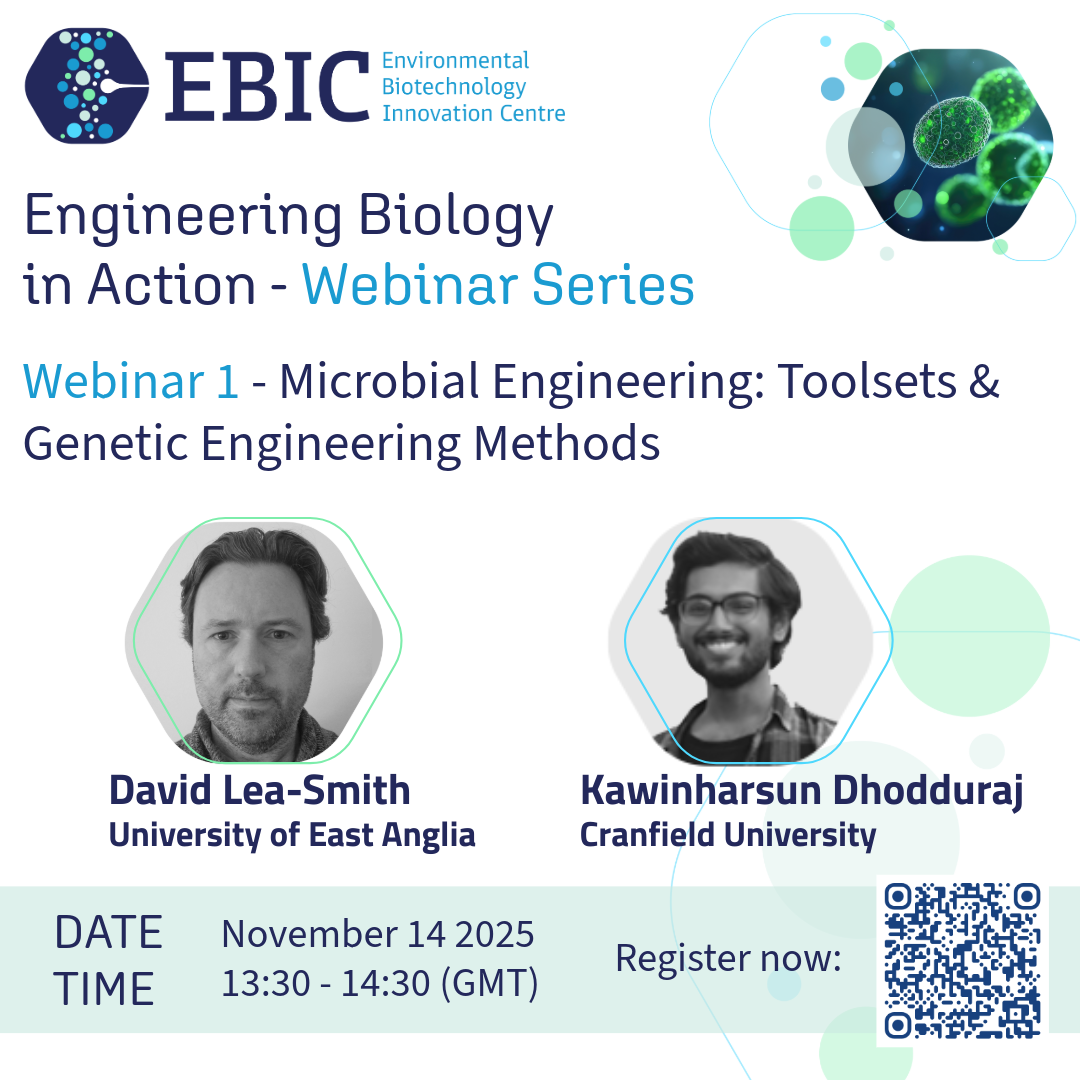
Funding Update
EBIC are thrilled to announce the four innovative projects that have been awarded funding as part of EBIC’s Flexible Funding Program.
EBES26
EBIC are excited to announce Engineering Biology for Environmental Solutions, our early career researcher conference for 2026. Join us this September in Southampton.
New ECR Rep
EBIC are delighted to announce the appointment of Lyuboslava Harkova as our new early career researcher representative for 2026. Congratulations Lyuboslava!
2025 Highlights
Join us to celebrate the fantastic year that was 2025. With thanks to all the team at EBIC, as well as our partners & collaborators for the hard work and dedication.
Blog: Paul Jeffrey
Crossing Disciplines: Reflections from a Synthetic Biology Conference. Professor Paul Jeffrey on presenting at the Synthetic Biology UK conference.

Innovate UK
The Engineering Biology in Canada report covers outcomes from the 2025 Global Expert Mission on engineering biology between the UK and Canada.

BBC Future
Francis Hassard, Cranfield University, discusses the bacteria commonly found in shower heads, if they should be a cause for concern and what you can do to mitigate any potential risks.

Registration Open
Register now for our Webinar – Microbial Engineering: Tools & Genetic Modification Techniques…

Post-conference round up
July 2025 saw the launch of our inaugural Early Career Researcher conference – Engineering Biology for Environmental Sustainability (EBES2025).

A Successful
SymposiumGlobal Experts Converge at Oxford for ISM2S 2025: Microfluidics Advancing Health and Environmental Solutions. The 2nd International Symposium…

Seedcorn Fund – Applications Open!
EBIC’s Seed Corn Fund, made possible by a funding injection from UK Research and Innovation (UKRI), will accelerate the commercialisation of new engineering…
International Women
in Engineering 2025This is the 12th year of celebrating International Women in Engineering Day (#INWED25), brought about by Women’s Engineering Society. This year the theme is #TogetherWeEngineer with a focus on giving women engineers a spotlight and raising their profile, as women are under-represented in engineering. In fact, according to figures in 2021, only 16.5% of engineers in the UK are women.
Watch PFAS workshops
We were delighted to host such a successful one-day workshop at Cranfield bringing together researchers, early-career scientists, and industry stakeholders to share the latest advances in PFAS detection, degradation, and biotechnological solutions. The event, supported by the Environmental Biotechnoly Network (EBNet) and the Environmental Biotechnology Innovation Centre (EBIC), (more…)
EBIC Launch our Podcast – EnvBio Tech
Are you fascinated by the world of engineering biology? Eager to discover how EBIC is leveraging this innovative field to enhance our environment? Tune in to our quarterly podcast, where we share exciting insights and host inspiring guests from the world of engineering biology and beyond.
Episode one features Professor Ronan McCarthy & Lyuboslava Harkova, both of Brunel University London, to discuss their fascinating work utilising biofilms and bacteria to breakdown plastic – just in time for this years #worldenvironmentday which for 2025 focuses on ending plastic pollution globally – watch now to see how EBIC are doing our part!
UKRI Engineering Biology Mission Hubs showcase
We were delighted to be invited by UKRI to participate in their first, in a series of 6, webinar – Engineering Biology Mission Hubs Showcase. The webinar was a great opportunity to discuss how EBIC are utilising engineering biology to create a sustainable environment – from bioremediation, to biosensors and waste & wastewater management, as well as our public engagement and management strategy.
Report on the Governance of Engineering Biology
This report focuses on the governance of engineering biology and helps to highlight the innovation and potential in the field, including a new bio-economy. The report makes 6 key recommendations to the government, including governing engineering biology products by their properties, not the originating technologies and encouraging a formal commitment to responsible innovation.
Trusted partners









